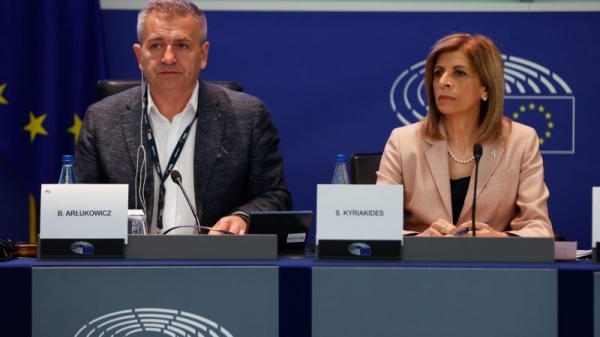EU Health Commissioner: Bloc must better prepare for drug shortages

Europe needs to be better prepared for the coming autumn and winter seasons to avoid medicine shortages like those experienced this year, the EU’s Health Commissioner Stella Kyriakides warned.
The colder months are often challenging for drug supplies, as cases of respiratory illness and influenza tend to spike across the bloc.
However, the recent winter brought particular problems for Europe, with a marked rise in respiratory infections and continued cases of COVID-19 causing a spike in demand for antibiotics and painkillers.
A particular cause of headaches was the short supply of amoxicillin, an antibiotic used to treat bacterial infections.
This circumstance must be avoided in the coming years, EU health chief Stella Kyriakides told MEPs in the first official meeting of the newly-set European Parliament’s health sub-committee (SANT) on Thursday (20 April).
“We need to be better prepared for next autumn and winter,” she said, assuring lawmakers that the European Commission is already working with the European Medicine Agency (EMA) to secure the availability of key antibiotics for next year.

Solving the issue of medicine shortages in the EU
The European Commission is pointing to the sharp increase in demand along with insufficient production capacity as the main reasons for medical shortages seen across the EU. Lawmakers are calling for the relocation of medicine manufacturing to Europe.
The role of HERA
One way of mitigating potential shortages could be through stockpiling with the European Health Emergency Preparedness and Response Authority (HERA), Kyriakides said.
HERA, a directorate-general of the EU executive, was established after the outbreak of the COVID-19 pandemic, to prevent and respond rapidly to future health emergencies.
In the SANT debate, lawmakers insisted that member states and stakeholders must continue to collaborate in order to address health at the EU level.
Kyriakides replied that, while many health issues remain of national competence, the Commission is engaging with the different national authorities and with industry in order to have a way to address this common challenge.
“We need to have a coordinated approach between the member states and use what we have learned from the pandemic,” she continued.
She cited joint procurement as an example of a mechanism used during the COVID-19 pandemic that HERA is considering applying in other situations.
According to Kyriakides, discussions are ongoing about the use of joint procurement for avian flu.

Ongoing bird flu not a risk for general public, say EU agencies
Avian influenza outbreaks will increase in the poultry sector along with occasional infections in mammals, but this poses minimal risk for humans, concludes a new report by scientific EU agencies.
Upcoming pharmaceutical legislation
Availability, accessibility, and affordability of medicines are key concerns that will be addressed by the reform of EU’s pharmaceutical legislation – which is due to be presented after several delays next week (26 April).
The revamping of the EU’s general legislation on medicines for human use is the last major health file to be unveiled by the EU executive before the end of the current legislative term in the second half of 2024.
Kyriakides said that this initiative will aim at ensuring a future-proof and crisis-resistant medicines regulatory system for Europe while continuing to foster innovation so the pharmaceutical industry “remains a world-class innovator”.
She insisted that access to medicines is a political priority because “there cannot be first and second-class citizens in the EU”.
“All of us deserve to have timely and equal access to medicines,” she concluded.

Commission to seek patient-centred, industry-friendly pharma rules reform
With only a few weeks before unveiling the EU’s revamped framework for pharmaceuticals, Health Commissioner Stella Kyriakides described the main drivers of the much-awaited reform, stressing the importance of finding the balance between patients’ and industry’s interests.
More on the same topic...



